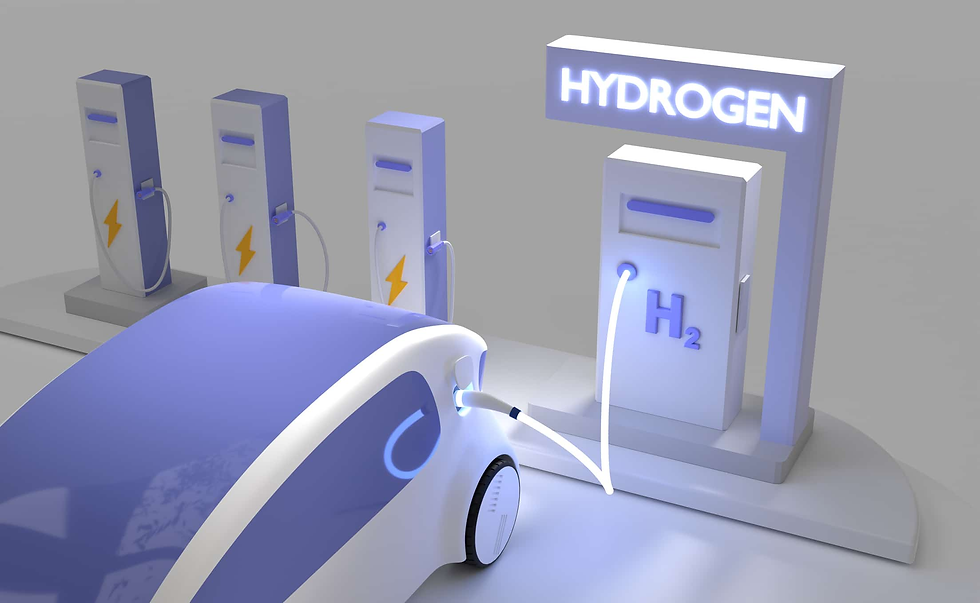Hong Kong's Hydrogen Ambitions: A Pathway to Sustainable Energy
- Team Arterial
- Oct 28, 2024
- 3 min read
Updated: Aug 31, 2025

In an era where cities are grappling with climate change and air quality issues, Hong Kong is positioning itself as a frontrunner in harnessing hydrogen as a fuel source. With ambitious plans to integrate hydrogen into its transportation and power sectors, the city aims to develop a sustainable hydrogen economy, but this journey is fraught with challenges and opportunities that are shaping its feasibility.
A Vision for the Future
The Hong Kong government has set an ambitious target of achieving carbon neutrality by 2050 as part of its Climate Action Plan 2050 (Hong Kong SAR Government, 2021). At the heart of this vision is the Hydrogen Fuel Cell Electric Vehicle (FCEV) Pilot Programme, which aims to roll out hydrogen-powered buses in public transportation. This initiative is not just a step forward for public transit; it represents a potential shift in how residents view energy consumption and sustainability.
Hydrogen in Public Transport
A tangible example of this ambition is the launch of Hong Kong’s first hydrogen bus, equipped with cutting-edge Ballard fuel cells. This bus, expected to hit the streets soon, is a part of a broader pilot program outlined by the Transport and Housing Bureau (2023). With an estimated 12,000 public buses operating in Hong Kong, the transition to hydrogen buses could significantly reduce greenhouse gas emissions and improve air quality, a pressing issue in the densely populated city.
Infrastructure: Building the Foundation
For hydrogen to become a viable energy source, a robust infrastructure is essential. This includes developing hydrogen production facilities, refueling stations, and distribution networks. The Hong Kong Hydrogen Production Pilot Project (Environmental Protection Department, 2022) emphasizes the potential for using renewable energy sources—like solar and wind—for hydrogen production through electrolysis. Currently, Hong Kong relies heavily on imported fossil fuels, making local hydrogen production critical for energy security and independence.
However, building this infrastructure comes with significant costs. According to estimates, establishing a comprehensive hydrogen refueling network could require investments in the range of HKD 1 billion (approximately USD 128 million), which poses a challenge in a city where space is at a premium.
Navigating Regulatory Waters
Creating a conducive regulatory environment is vital for the successful implementation of hydrogen technologies. The Hydrogen Economy Development Plan (Innovation and Technology Commission, 2023) highlights the need for clear safety standards and guidelines that can promote innovation while ensuring public safety. The Regulatory Framework for Hydrogen Technologies report (Hong Kong Science and Technology Parks Corporation, 2022) emphasizes that, although hydrogen is a clean fuel, public acceptance is contingent on comprehensive safety measures being clearly communicated and implemented.
Public Awareness and Education
Public perception plays a crucial role in the feasibility of hydrogen as an energy source. While hydrogen is celebrated for its potential to reduce air pollution—particularly in a city struggling with smog—misconceptions about its safety linger. The World Health Organization (2020) has pointed out the detrimental effects of poor air quality on public health, underscoring the importance of transitioning to cleaner energy sources. Educational initiatives that inform residents about the benefits of hydrogen technology and its safety measures are essential to foster acceptance and support for this shift.
Collaborating for Innovation
Collaboration among government, academia, and private enterprises is fundamental to driving hydrogen initiatives forward. According to McKinsey & Company (2021), innovation in hydrogen production and utilization could play a pivotal role in meeting global energy demands while minimizing environmental impact. In Hong Kong, fostering partnerships can lead to the development of cutting-edge solutions tailored to local conditions, helping to reduce costs and improve efficiency.
Global Context and Local Application
Hong Kong's efforts to embrace hydrogen come at a time when other cities worldwide are also exploring this clean energy source. For instance, countries in Europe and parts of Asia have already made strides in integrating hydrogen into their energy systems. Learning from these examples, Hong Kong can tailor its approach to meet its unique challenges and leverage its position as a global financial hub to attract investment and expertise in the hydrogen sector.
References
Hong Kong SAR Government. (2021). Hong Kong’s Climate Action Plan 2050.
Transport and Housing Bureau. (2023). Pilot Programme on Hydrogen Fuel Cell Electric Vehicles.
World Health Organization. (2020). Air Quality and Health.
Environmental Protection Department. (2022). Hong Kong Hydrogen Production Pilot Project.
Innovation and Technology Commission. (2023). Hydrogen Economy Development Plan.
McKinsey & Company. (2021). Hydrogen: A Perspective on the Future of Energy.
Hong Kong Science and Technology Parks Corporation. (2022). Regulatory Framework for Hydrogen Technologies.




Comments